
Oskar Schwab, born February 16, 1890 in Themar, moved from Themar to Schleusingen on October 18, 1919. His wife Frieda Schwab, née Steindler, born May 1, 1888 in Cham/ Oberpfalz, came from Cham to Schleusingen on December 8, 1919.
Her son Egon Schwab, born 4.11.1922 in Schleusingen, died on May 25, 1933. Egon was handicapped and sat in a wheelchair. He was buried at the Jewish cemetery in Schleusingen.
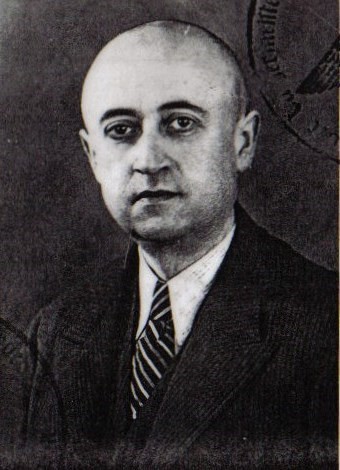
Photo: Oskar Schwab
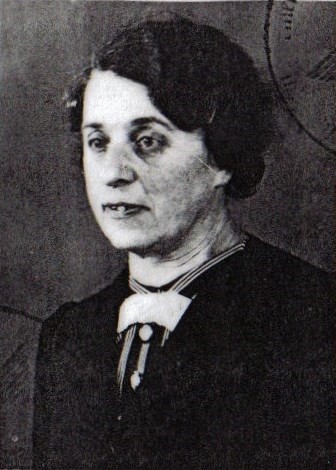
Photo: Frieda Schwab, née Steindler
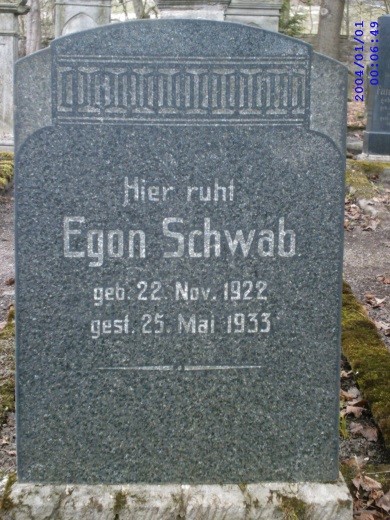
Photo: Gravestone Egon Schwab (Collection Kerstin Macher)
Together with the related family Karl and Recha Müller they ran a fashion shop in Bahnhofstr. 2.
Karl Müller, born January 1, 1886 in Themar, came from Themar to Schleusingen on February 11, 1920. His wife Recha Müller, née Grünbaum, born 4 August 1893 in Gemünden, moved on 27 November 1920 from Gemünden to Schleusingen.
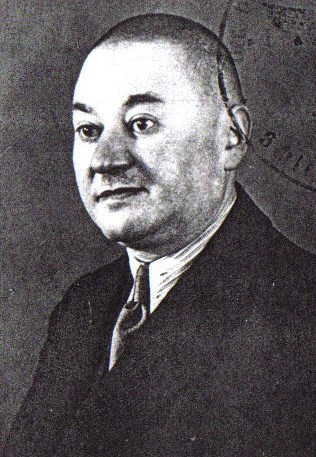
Photo: Karl Müller
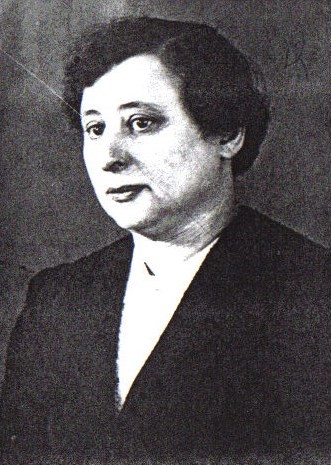
Photo: Recha Müller, née Grünbaum
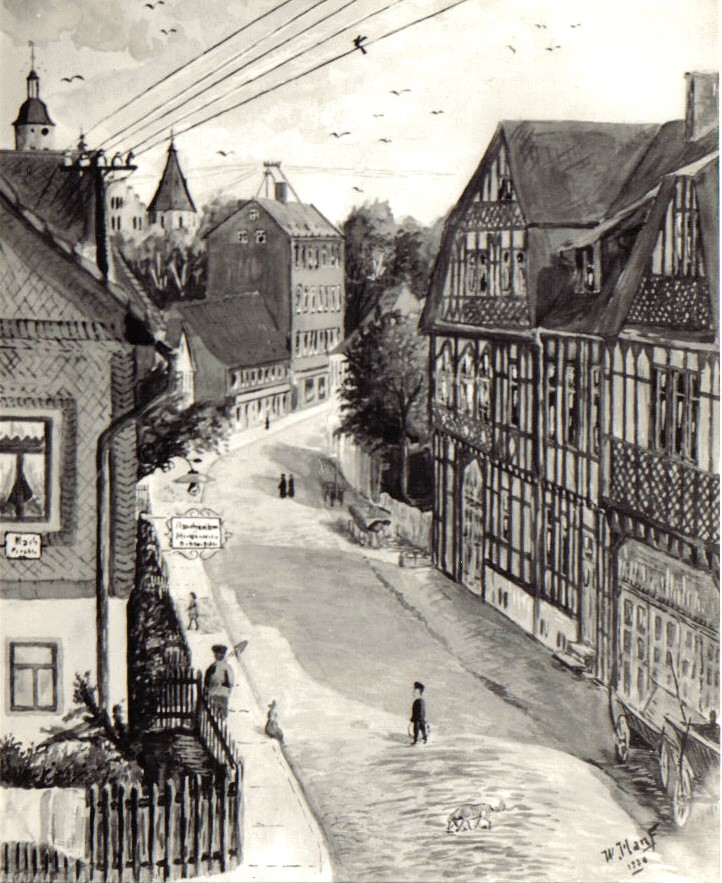
Photo: View into Bahnhofstraße (in NS Adolf-Hitler-Straße) (Collection: Hans Schulz)
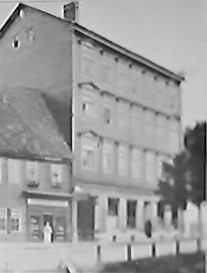
Photo: Fashion house Müller & Schwab, house number 2 - left side of the street, last house
The fashion house in Bahnhofstraße 2, where the two Jewish businessmen Karl Müller and Oskar Schwab had rented, was one of the first demonstrable targets of anti-Semitic actions after the First World War. In November 1920, the "Agent of the Schlesische Feuer- und Glasversicherungsgesellschaft" and owner of the house, Wittich, offered a reward for the conviction of the perpetrators who had thrown in a pane of glass.
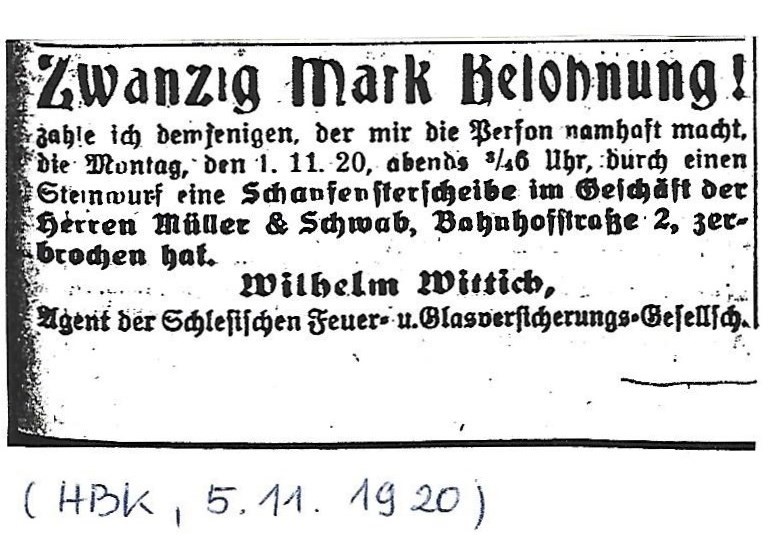
Photo: Advertisement in Henneberger Kreisblatt
1922 several extensive articles appeared in the Henneberger Kreisblatt in which Jewish Schleusinger tried to publicly justify themselves against accusations. Again the fashion house "Müller & Schwab" was the target of attacks and slander. According to various contemporary witnesses, the shop was described as "by far the best known and best fashion shop in the surrounding area". This was certainly one of the main reasons for the massive attacks: the elimination of competition. On 15 May 1922, the two businessmen had a large-format, double-framed article with the headline: "Zur Aufklärung" printed in the "Henneberger Kreisblatt". With this they defended themselves against a warning of the Schleusinger authorities because of the opening of their shop on Sunday, with the justified reference to other shops of non-Jewish shopkeepers, which were also opened on Sunday, but which would not have received a warning for this. They did not wrongly suspect that their owners had reported them and filed a counter-report.
However, after the so-called "boycott of Jews" of April 1, 1933, as the National Socialists called the boycott of Jewish shops, department stores, banks, doctors' surgeries, law firms and notaries' offices, which the National Socialist regime had planned since March 1933 and had carried out throughout Germany on Saturday, April 1, 1933, there were still customers willing to buy at "Müller & Schwab," which is reported by contemporary witnesses. But everyone who wanted to enter this shop was photographed from the opposite side of the street (formerly the cinema). And so demonstrative statements for the Jewish businessmen gradually disappeared.
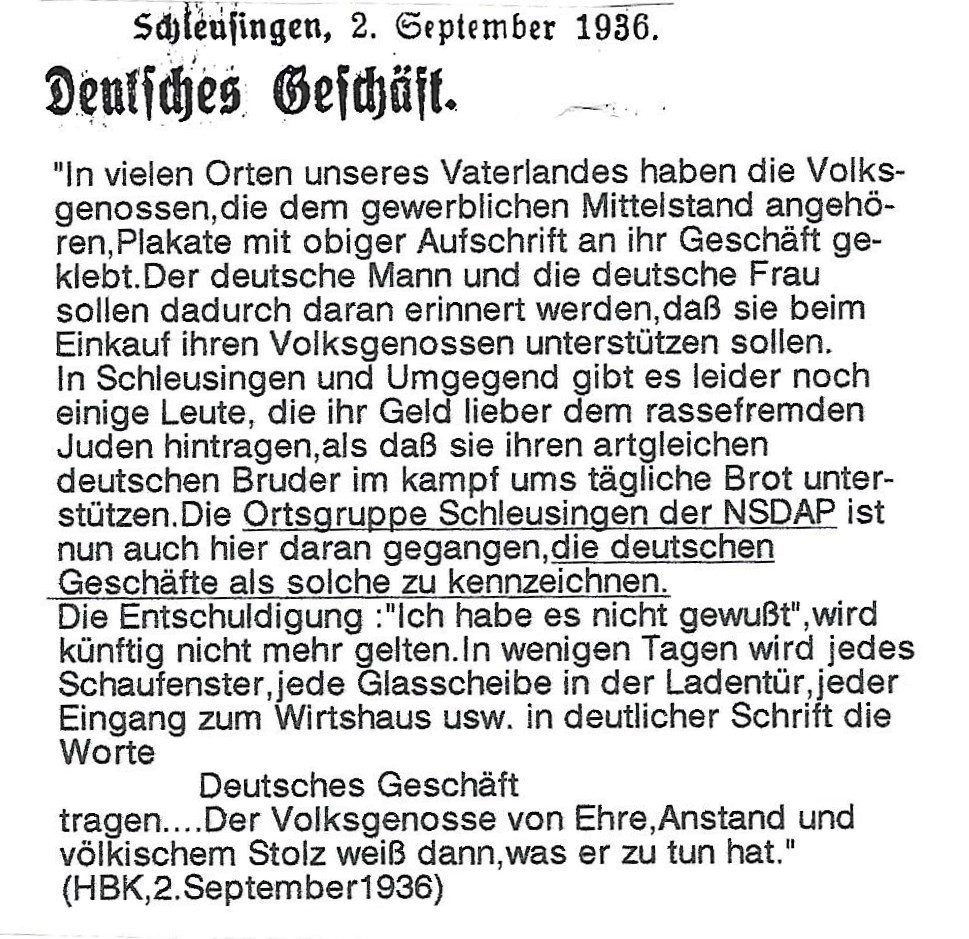
Photo: Article in Henneberger Kreisblatt
A campaign against a Schleusinger company led by a non-Jewish businessman who cooperated with the fashion house "Müller & Schwab" shows how the elimination of Jewish competition could also take place indirectly: In the "Erfurter Stadtnachrichten", "Der deutsche Textil-Arbeiter", "Kreisanzeiger Schleusingen, Stadt Suhl und Zella-Mehlis", for example, articles with the headline: "Die Strumpfkontrollen der Firma Lucius. Deutsche Arbeiterinnen sollen beim Juden kaufen" and in issue no. 3 of the NS propaganda sheet "Stürmer" of 1934 on the title page with the headline: "Luciusstrümpfe. What they talk about in Schleusingen".
Letters printed there with different dates have one thing in common: they all deal with the production, distribution and sale of the aforementioned "Lucius stockings". The first letter explains that there is a stocking factory in Schleusingen owned by Johann Anton Lucius, Erfurt-Chemnitz, which has signed a contract with the Jewish businessmen Müller and Schwab in Schleusingen for sole distribution. The "German businessman" Hans Dunst, the owner of a Schleusinger company in the Bahnhofstraße, turned to the Lucius company to take over this sole distribution. In a letter from the Lucius company dated 7 November 1933, it was stated that the management rejected the offer "in consideration of the very pleasant long-standing relationship with the Müller & Schwab company". Furthermore, Mr. Lucius formulated: "Mr. Müller & Schwab have been buying quite faithfully from me for many years; their business is in the same street, and I do not compete with old customers."
The third letter contains Hans Dunst's reply of 10 November 1933 to the company "Joh. Anton Lucius", in which he declares that the workers should support their employer by wearing Lucius stockings. However, these women could not be forced to buy the stockings "from the Jew". He concludes with the words: "I reserve the right to forward your letter to the Kampfbund, of which I am a member, for comment". In the fourth and last article, the editor names the Schleusinger Lucius sales manager, "a certain Herr Bodenstein . He is a Freemason and a steel helmet man and is known for his reluctance to accept Nazis into his company. It must be expected that someone will be found in Thuringia who will ensure that the Lucius-Bodenstein methods are put to rest." He denounces the wearing of stockings by the workers and calls it a restriction of personal freedom. At the end the writing leads to a threat. "Stocking controls may have been a matter of course in Judendeutschland yesterday. In the new Germany, the Lucius-Bodenstein people were advised to adapt to the changed conditions quite soon."
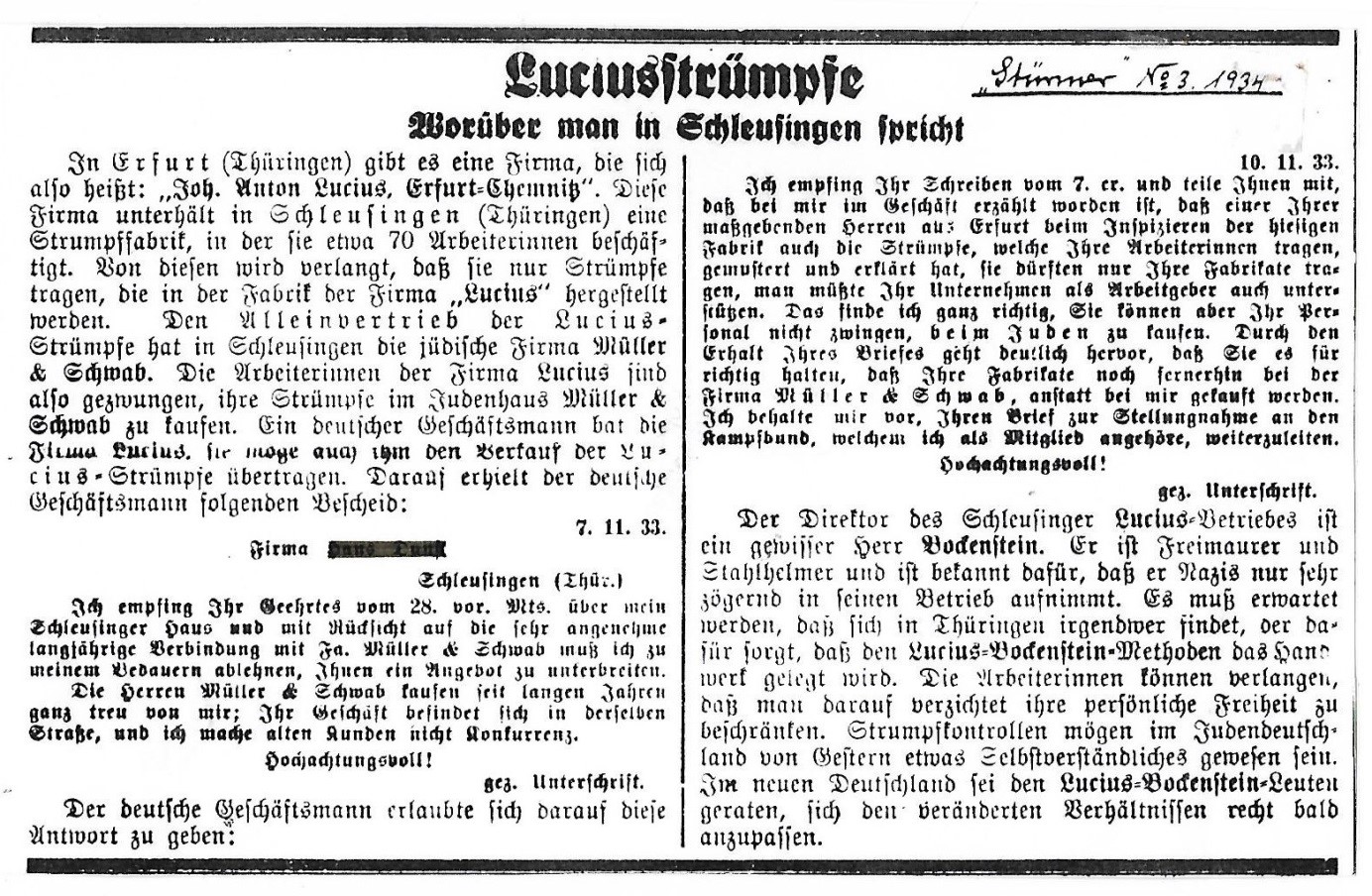
Photo: Article from the "Stürmer" No. 3 from 1934
It is remarkable that the press is taking up this matter again after months in order to bring movement into the concern of Hans Dunst. The material interests in the sole distribution of Hans Dunst's stockings and his associated action against Jewish merchants were exemplary. Even if it is not known how the management of the stocking factory subsequently behaved, the National Socialists continued their proceedings against "Müller & Schwab". Under the heading "A civil servant's wife sabotages the National Socialist reconnaissance campaign" the following text can be found in the "Henneberger Kreisblatt":
"In order to finally convict some of the people who betrayed their people by shopping with the Jews, some SA comrades had armed themselves with a camera and lined up in front of the Judenladen Müller & Schwab. Some of the folk comrades had already been put on the record, and some of them were preparing to enter the shop again. At that moment, the wife of the city policeman Klein joined them and shouted: 'Don't go in, don't go in, the SA is standing there taking pictures of you'. Pg. Beck, the leader of the SA, said to the Jew-friendly civil servant's wife: 'Mrs Klein, your husband is a municipal civil servant. How do you come to stand so openly against the SA and take sides for the Jews? Mrs. Klein then made the classic statement: 'Lick my A...'. We note:
The detailed process illustrates the perversion of the prosecution. A woman bought from a shop of her choice and was to be reported at the end by her own husband, who was a policeman. The confrontation between Beck and Klein proves how self-opinionated Schleusinger functionaries or officials appeared. Here a power struggle was publicly fought: an SA member vs. municipal police. With such events the National Socialists reached their goal. Jewish businesses were increasingly avoided by the non-Jewish population. The private sphere of the Klein family was also disregarded, and the place of residence with its "special" conditions was revealed to the public. The Kleins lived in Adolf-Hitler-Straße 2 (today Bahnhofstraße) on the third floor together with the Müller and Schwab families.
Oskar Schwab (48 years old) and Karl Müller (52 years old) and the other Jewish men from Schleusingen and the surrounding communities were arrested and transferred to the Buchenwald concentration camp during the Reichspogromnacht.
Oskar Schwab was registered in the Buchenwald concentration camp under prisoner no. 20643. He was released on January 4, 1939, Karl Müller was registered under prisoner no. 20638, his release was a few days earlier on December 16, 1938.
The entire campaign, the articles in "Stürmer" and "Henneberger Kreisblatt" and the attempts to deter customers by photographing them, led to success. The incomes of the two businessmen sank and on 18 January 1939 the entry in the "Henneberger Kreisblatt" can be found:
"Müller & Schwab, Schleusingen, has been entered in the commercial register A no. 351: The company is extinguished."
According to a contemporary witness, the Müller and Schwab families, who wanted to leave Schleusingen, had their packed crates with all their possessions stolen from Hamburg before they emigrated. Oskar Schwab not only took care of himself and his wife, but also helped the four-person Rosengarten family from Themar to emigrate.
Oskar and Frieda Schwab, Karl and Recha Müller left Schleusingen in 1939 and, together with the Rosengarten family, found refuge in Shanghai/China.
1947 they left Shanghai to move with the passenger ship "General William H. Gordon" to San Francisco/California. They arrived there on May 16, 1947.
The following letter from the Hildburghausen district archives shows that the Müller and Schwab families actually wanted to return to Schleusingen:
"An das Kreisamt des Kreises Suhl - Umsiedleramt - in Suhl am 12.5.1947
Betr.: Repatriierung deutscher Flüchtlinge'
Annexed is a letter from the Repatriation Association in Shanghai. The two persons there are the textile merchant Oskar Schwab and his wife Frieda, who had to leave Germany in 1938 because of their Jewish ancestry.
I ask you to take the necessary steps for the return journey of the Schwab and his wife and to give me a reply.
Deputy mayor"
Why this did not happen could not be clarified. The families decide in 1947 for their new home San Francisco.
California Passenger and Crew Lists, 1893-1957